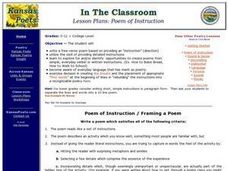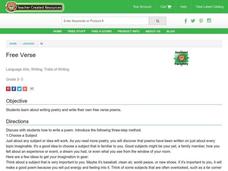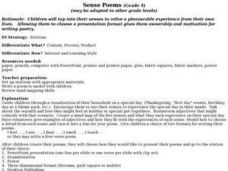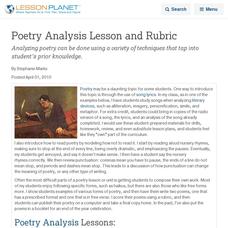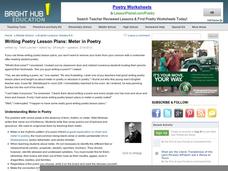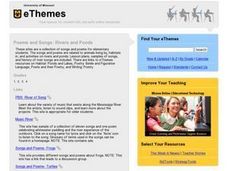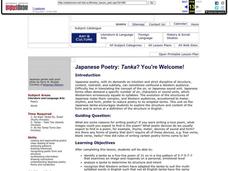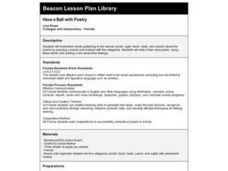Curated OER
Poem of Instruction
Students write a free-verse poem and utilize the skill of providing detailed instructions. identify opportunities to create poems from simple, everyday verbal or written instructions. They study everyday language that has merit as poetry.
Curated OER
Free Verse
Students write free verse poems. In this poetry instructional activity, students use a three-step method to create a free verse poem. Students brainstorm ideas, let their ideas "incubate," and write a free verse poem.
Curated OER
Poetry Gifts
What kind of shoe is this person? What time of day is this person? Aspiring poets’ responses to a list of questions provide descriptive words and phrases that can be crafted into a blank verse poem. A link to sample poems is provided.
Curated OER
Poetry to the Core
Second graders examine several examples of poetry in the six lessons of this unit. The lessons focus on five poetic forms, couplets, quatrains, limericks, Haiku, and free verse.
Curated OER
Sense Poems
Students explore 5 senses poetry. In this poetry writing lesson, students visualize a special day and brainstorm related vivid adjectives and phrases. Students create mindmaps of the five senses to go with their visualization and write...
Illinois Department of Natural Resources
Section Two: Why is Biodiversity Important?
Explore soil, genetic traits, natural resources, and pollution in a series of lessons that focus on biodiversity. Kids complete experiments to learn more about the importance of varied genes and organisms in an ecosystem.
Santa Ana Unified School District
Early American Poets
The poems of Walt Whitman and Emily Dickinson are the focus of a unit that asks readers to consider how an artist's life and changes in society influences his or her work. After careful study of Whitman's and Dickinson's perspectives on...
Office of Migrant Education
Poetry: Form, Syllables, Mood, and Tone
Looking for a resource to introduce homeschoolers and other out-of-class learners to the elements of poetry? Check out this packet that defines and illustrates important poetry terms.
Prestwick House
"Because I could not stop for Death" -- Visualizing Meaning and Tone
Emily Dickinson's "Because I could not stop for Death" provides high schoolers with an opportunity to practice their critical thinking skills. They examine the images, diction, rhythm, and rhyme scheme the poet uses and consider how...
Curated OER
Poetry Analysis Lesson and Rubric
Analyzing poetry can be done using a variety of techniques that tap into student's prior knowledge.
Curated OER
Greeting Cards
Students create greeting cards. They listen to verses from various cards and evaluate each one. They research websites of greeting card makers and complete a chart. They discuss themes and ideas in greeting cards and edit their free...
Curated OER
Poetry In Motion
Fourth graders read and analyze poetry and examine the process of writing poetry. They read and analyze the poem "From a Railway Carriage" by Robert Louis Stevenson, and answer comprehension questions. They identify the similes,...
Curated OER
Meter in Poetry
A good poem has form and structure built into it. Middle schoolers see that the structure of a poem consists of stanza, form, rhyme, and meter. The structure also contributes to a poem's meaning. After listening to, and discussing, a few...
Curated OER
Lesson Plan for Waiting to Waltz: A Childhood by Cynthia Rylant
Sixth graders examine the elements of writing poetry. In this creative writing activity, 6th graders discuss a book of poetry in the setting of Appalachia. Students incorporate childhood experiences into the development of visual and...
Curated OER
Rhythm & Improv: Jazz & Poetry
Students analyze the elements of poetry and jazz. In this critical thinking skills lesson, students take a closer look at the rhyme, rhythm, alliteration, form, free verse, lyricism, and imagery that exist is jazz as well as poetry.
Angel Island Immigration Station Foundation
Culminating Writing Project - Reporting on Angel Island
The unit study of Angel Island Immigration Station concludes with scholars using information from the previous lessons to craft a news story about the Angel Island program.
Curated OER
Personalized Poetry Portfolio
Eighth graders create their own poetry portfolio containing poems that relate to Students' lives and families. The portfolio consist of the following types of poems: acrostic, diamante`, haiku, cinquain, and free verse.
Curated OER
Poetry: Using Prosodic Devices
Students examine poetry examples in free verse focusing on their prosodic elements. After critiquing works by several authors, they write their own poems utilizing such devices as alliteration, repetition, rhyme, and stanzas.
Prestwick House
The Poetry of Bob Dylan
Bob Dylan's selection as the 2016 winner of the Nobel Prize for Literature, the first songwriter ever to receive the honor, has focused the attention of a new generation on the work of the legendary artist. Class members analyze the...
Curated OER
Poems and Songs: Rivers and Ponds
Young scholars explore songs and poems related to the animals, habitats, and activities on rivers and ponds. They listen to song clips, explore various websites, read poems and song lyrics, complete worksheets, and define key vocabulary...
Curated OER
Japanese Poetry: Tanka? You're Welcome!
Students explore the structure and content of the Tanka form and to arrive at a definition of the structure in English. They analyze a tanka to determine its structure and intent and compose two Tanka; one in traditional form and one...
Curated OER
Prairie Poetry
Ninth graders take note of the ways in which word choice, rhythm, language and narrative voice, as well as point of view in a poem can be used to evoke a time and place. They use their insights to create a poem of their own.
Curated OER
Have a Ball with Poetry
Second graders brainstorm words pertaining to the senses about the beach. They write a free verse poem, using these words and adding a line about their feelings.
Curated OER
Ideas for Teaching Creative Poetry
Students read and write a variety of forms of poetry and create an original page for a class "I Spy" book. They read and discuss the form of poetry used in the "I Spy" books, and conduct Internet research on how the "I Spy" books are...


